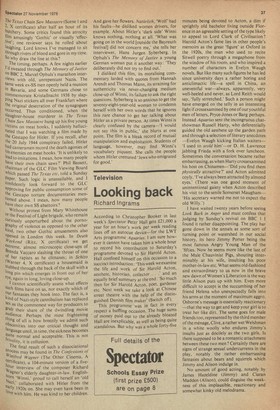Television
Looking back
Richard Ingrams
According to Christopher Booker in last week's Spectator Peter Hall gets £21,000 a year for an hour's work per week reading lines off an autocue device—for the LWT Arts programme Aquarius. I am sure however it cannot have taken him a whole hour to record his contribution to Saturday's programme devoted to Sir Harold Acton. Hall confined himself on this occasion to a succinct introduction : 'This week we examine the life and work of Sir Harold Acton, aesthete, historian, collector . . and an equally brief summary at the end: 'So much then for Sir Harold Acton, poet, gardener etc. Next week we take a look at Chinese street theatre with the help of the distinguished Danish film maker' (Switch off).
This programme was in fact in every respect a baffling occasion. The huge sums of money paid out to the already bloated Hall are inexplicable, as well as being quite scandalous. But why was a whole forty-five minutes being devoted to Acton, a dim if sprightly old bachelor living outside Florence in an agreeable setting of the type likely to appeal to Lord Clark of Civilisation ? Harold Acton's fame lies in other people's memoirs as the great 'figure' at Oxford in the 1920s, the man who used to recite Sitwell poetry through a megaphone from the window of his room, and who inspired a number of characters in Evelyn Waugh novels. But like many such figures he has led since university days a rather boring and anticlimactic life—a spell in China, an uneventful war—always, apparently, very well-heeled and never, as Lord Reith would say, 'fully strretched.' Such a person might have emerged on the telly in an interesting light if crossexamined by one of our youthful men of letters, Pryce-Jones or Barg perhaps. Instead Aquarius sent the incongruous chatshowman Russell Harty, who deferentially guided the old aesthete up the garden path and through a selection of literary anecdotes —Evelyn Waugh kicking Italian waiters— '1 used to scold him'—or D. H. Lawrence jabbing Frieda with a fork over luncheon. Sometimes the conversation became rather embarrassing, as when Harty crossexamined his host on Chinamen—'Did you find them physically attractive?' and Acton admitted coyly, 'I've always been attracted by almond eyes.' (There was one good moment of unintentional gaiety when Acton described his visit to the senile Somerset Maugham'His secretary warned me not to expect the old Willy.')
I have waited twenty years before seeing Look Back in Anger and must confess that judging by Sunday's revival on BBC I I found it rather disappointing. The play has. gone down in the annals as some sort of turning point or watershed in our social history, its hero Jimmy Porter being the most famous Angry Young Man of the 'fifties. Now he seems more like the last of the Male Chauvinist Pigs, shouting interminably at his wife, insulting his poor mother-in-law etc. What seems old-fashiond and extraordinary to us now in the brave new dawn of Women's Liberation is the way little Alison puts up with him. Even more difficult to accept is the succumbing of her friend Helena who unexpectedly falls into his arms at the moment of maximum aggro. Osborne's message is essentially reactionary —that the way to get and keep your girl is to treat her like dirt. The same goes for male friends too, represented by the third member of the ménage, Clive, a rather wet Welshman in a white woolly who endures 'Jimmy's insults just as docilely as the two girls. Is there supposed to be a romantic attachment between these two men? Certainly there are signs of strange sexual undercurrents in the play, notably the rather embarrassing fantasies about bears and squirrels which Jimmy and Alison indulge in.
No amount of good acting, notably by James Hazeldine (Jimmy) and Ciaran Madden (Alison), could disguise the weakness of this implausible, reactionary and somewhat kinky old melodrama.










































 Previous page
Previous page